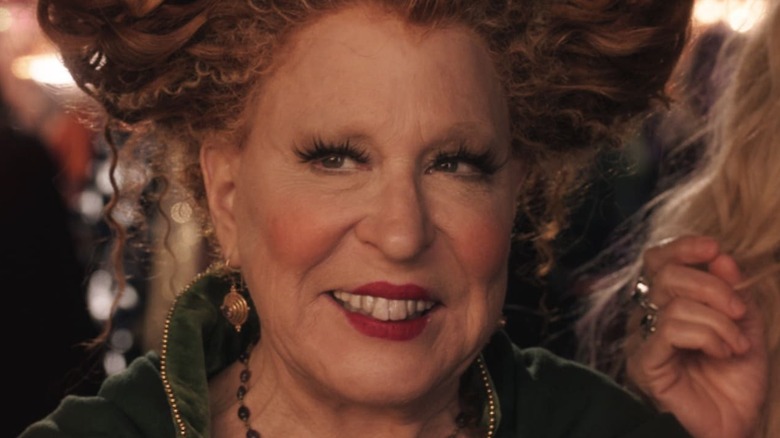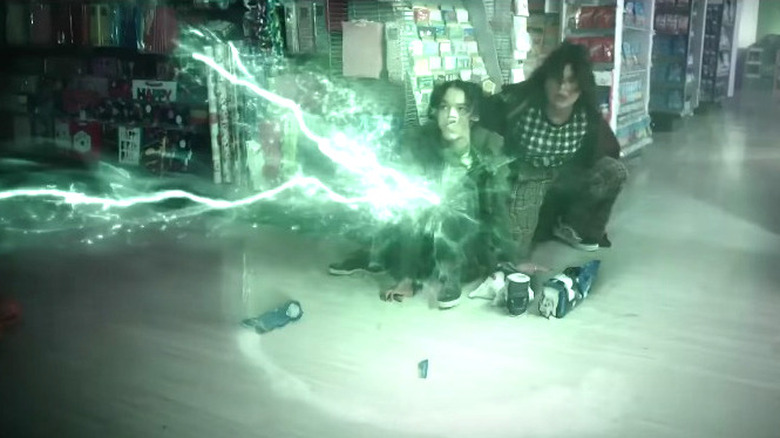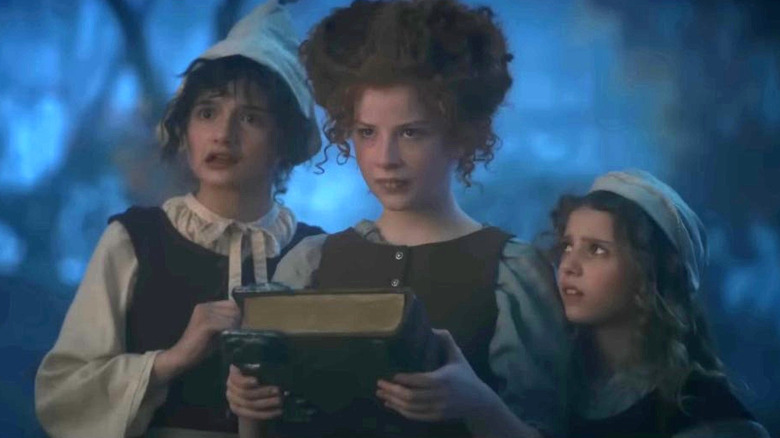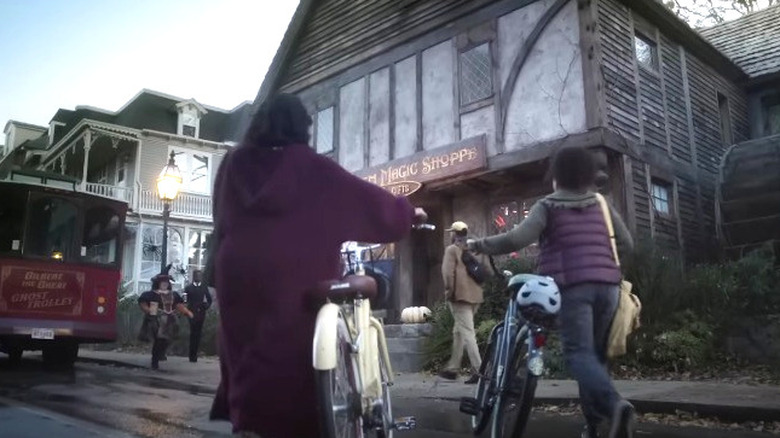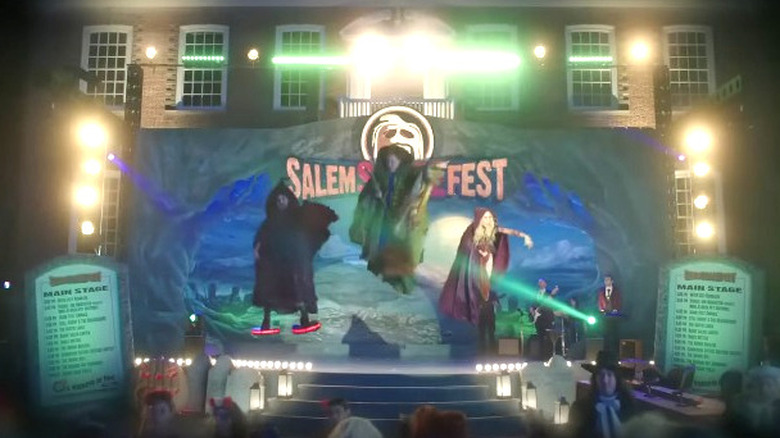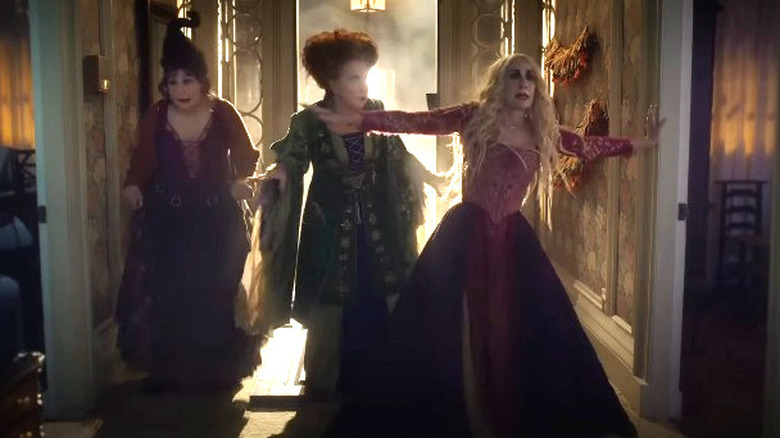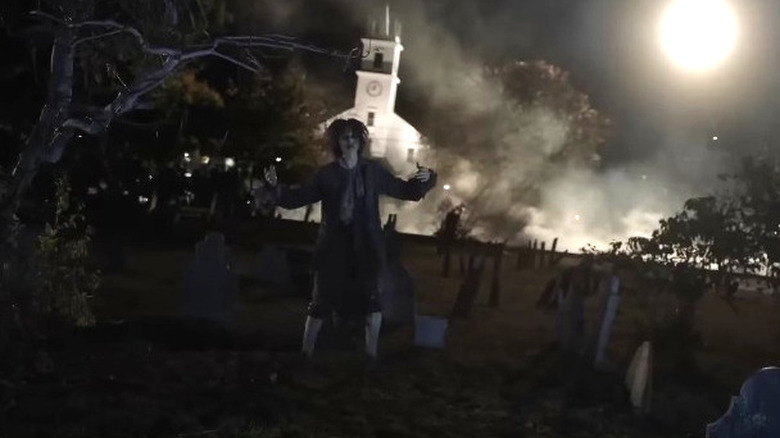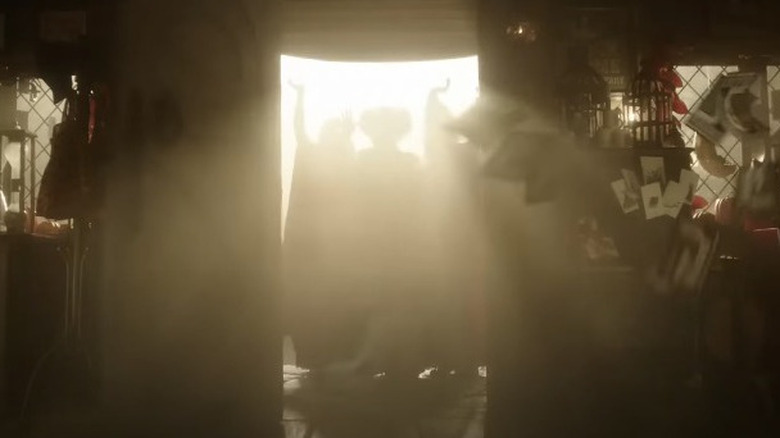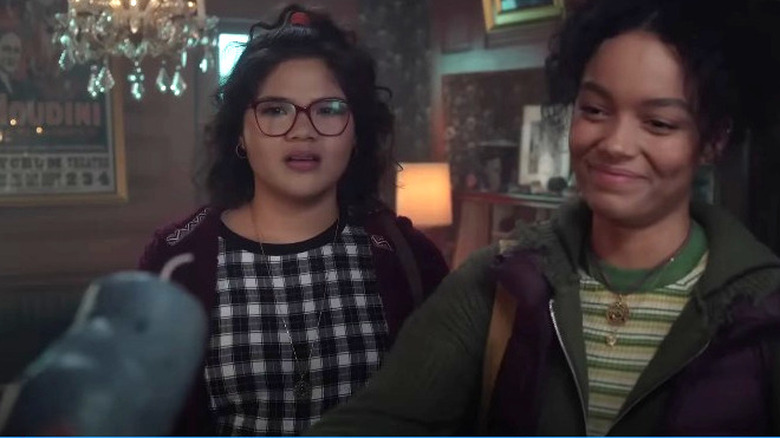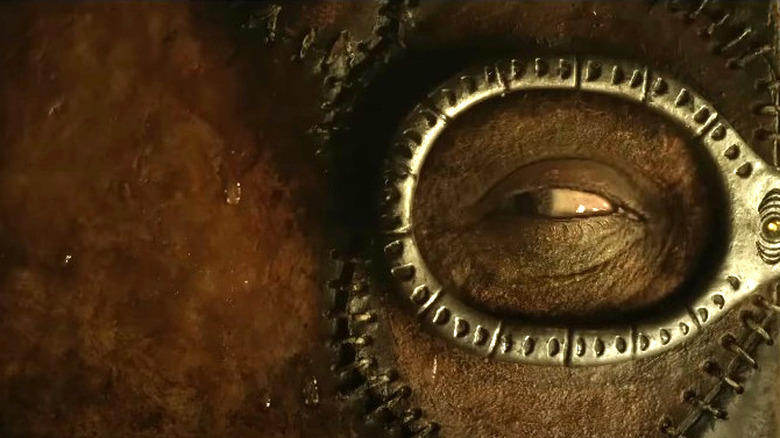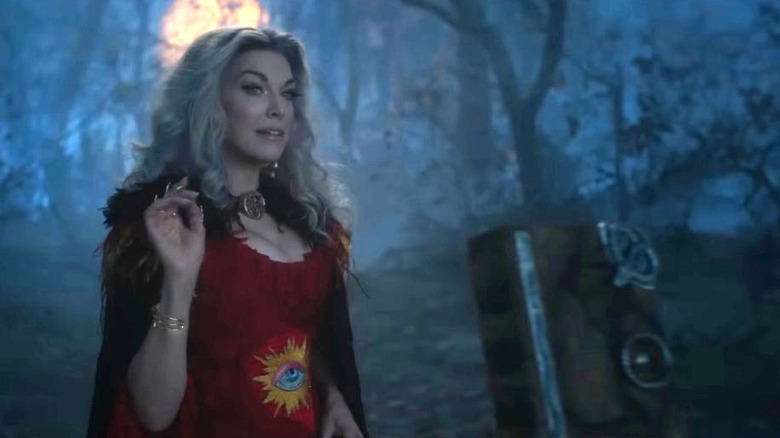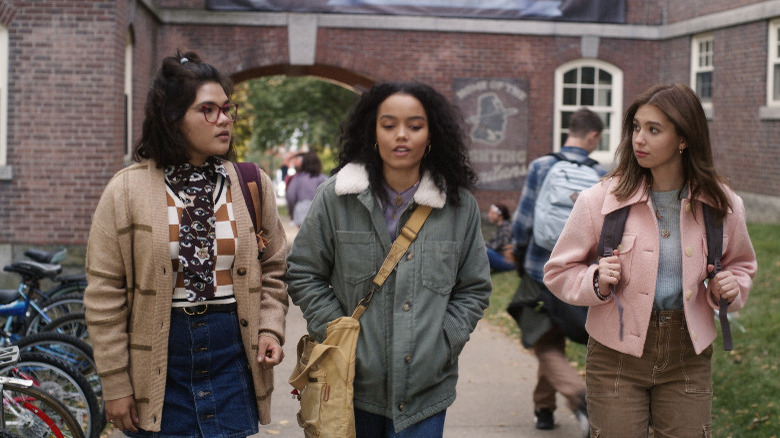The Biggest Differences Between Hocus Pocus 2 And The Original
This post contains spoilers for "Hocus Pocus 2."
It took 29 years, but the world finally got a second visit from the menacing Sanderson sisters in "Hocus Pocus 2." Winifred, Sarah, and Mary (Bette Midler, Sarah Jessica Parker, and Kathy Najimy, respectively) all returned to resurrect their beloved witch characters for another romp through the streets of Salem, Massachusetts, on October 31st. This time, instead of simply trying to devour the soul of a child in order to live longer, they're hoping to cast a spell that will make them the most powerful witches who have ever lived.
Standing in their way are three girls named Becca, Izzy, and Cassie (Whitney Peak, Belissa Escobar, and Lilia Buckingham), friends who are experiencing a speed bump in their relationship thanks to Cassie's moronic boyfriend Mike. If this unofficial coven can come together, they can stop the Sandersons, save Salem, and protect the world from their reign of amusing terror.
Although "Hocus Pocus 2" is very much in the spirit of the original "Hocus Pocus" (and references it quite often), it's still its own movie and there are some very noticeable differences between the two. There are obvious differences — like the year it takes place, there's a new cast, a new spell, etc. — but we're not here to talk about those. Instead, we're focusing on the differences in storytelling priorities, character development, and tone. These are the biggest differences between "Hocus Pocus 2" and the original.
More magic
Magic has always been an integral part of the "Hocus Pocus" world. Besides the Sandersons being witches themselves, Max and Allison had to occasionally use their own rudimentary understanding of magical theory to best the soul-eating witches. "Hocus Pocus 2" ups the ante by introducing a new character played by "Ted Lasso" standout Hannah Waddingham, who is credited as the Witch Mother, and bringing in three magical teenagers who are just discovering their power.
Not only that, but the character of Gilbert (played by Sam Richardson) also has the ability to wield some magic thanks to the time he's spent with Winifred's Book over the decades. On top of that, though, there are a lot of bolts of magic flying around in this movie. Winifred is zapping stuff with her green power left and right, and the third act becomes a venerable witch war as the Sandersons attempt to complete their spell and Becca shares her magic with Izzy and Cassie.
Then there are those darn Roombas. The fact that they can be used to transport Mary across the night sky isn't surprising (we saw a version of that in the first film), but their strange ability to operate of their own free will is definitely unique. They joke multiple times that the tiny vacuums "have a mind of their own," but they manage to track down and free the sisters with no trouble whatsoever. There's a whole different kind of magic happening there.
Funnier prologue
Just like the original "Hocus Pocus," the sequel begins with a prologue set three centuries prior to the events of the film. The main difference here is tone. While the first film's prologue had a few silly moments, it is significantly darker than what we get in the sequel. The prologue of "Hocus Pocus" sees young Thackery Binx attempt to save his sister Emily from getting her soul devoured by the Sandersons. When he fails, the town gets together and hangs the sisters right there in the street.
In "Hocus Pocus 2," 16-year-old Winifred Sanderson is furious because Reverend Traske (played by Tony Hale) has taken it upon himself to find a husband for her. Not only does she have no interest in getting married, but she certainly doesn't want to marry John Pritchett because she's in love with Billie Butcherson, with whom she shared a single kiss in a graveyard. When Traske attempts to take Mary and Sarah away from Winifred, they flee to the forbidden woods.
Here, they meet the Witch Mother. She tries to take their souls but realizes they're different than other children. She gives them the magic book and wishes Winifred a happy birthday. Winifred uses the book to start a fire in the village. So, there's darkness there, but it is a very goofy tone compared to the original. Again, the first movie begins with child murder and execution. The sequel begins with Tony Hale screaming at a spider.
Less Halloween ambiance
This one will be in the eye of the beholder, but the pacing of "Hocus Pocus 2" detracts a little bit from the natural Halloween vibes that permeated throughout the original film. For comparison, when watching "Hocus Pocus," there are multiple slow master shots establishing the town of Salem. The leaves blaze with autumn colors, creating an almost dreamlike atmosphere as if we are experiencing the most idealized setting for the spooky holiday.
We also see more of the town as Max rides his bike home from school through the cemetery before having to make it the rest of the way without his shoes thanks to Jay and Ice. The streets at night are populated with people filling the frame as they journey from house to house in search of candy. The seasonal ambiance is like a cozy, weighted blanket that allows the viewer to feel at ease, even when the subject matter gets very dark.
With the sequel, there's no time to appreciate the scenery to the same extent because the movie is always moving. Even when Becca rides her bike to school, the montage of Salem is so quickly cut and the music is so intrusive that you can't experience that same sense of immersion and (for lack of a better term) coziness. Oftentimes, the streets are empty (perhaps because everyone is at the festival), and Salem feels overall like a less vibrant and populated place.
A bigger musical number
You can't make a sequel to "Hocus Pocus" without a musical number. Aside from Bette Midler's history as a singer, the musical number in the first film is so iconic that not including one in the second installment would have felt wrong. This time, the musical number is bigger and it goes on for longer. The time the sisters spend on stage actually singing is probably equal to the first film, but the choreography and music continue beyond that initial performance.
In the first film, Winifred casts a spell on all the parents of Salem that keeps them dancing without a care in the world for the entire night. This ensures that Sarah can lure all the children of Salem (except for a young Gilbert, apparently) away from the town. In "Hocus Pocus 2," Winifred uses the power of her song to turn the citizens of Salem into her minions to search for Mayor Traske.
With them dancing through the streets, occasionally repeating the spell like a chant, she and her sisters are free to look elsewhere. They cut away from the dancing to show us what the other characters are up to, before cutting back to the dancing, as the crowd surrounds the mayor and steals the candy apple he'd been waiting all year for. (Do keep your eyes peeled for some very familiar looks in the crowd's costuming, by the way.)
Sarah's not quite so... thirsty
The Sanderson sisters' dynamic works like this: Winifred is the delusional megalomaniac with the power; Mary is the very capable, unappreciated, self-deprecating sibling; and Sarah is the goofy airhead. Basically, they're the Three Stooges. One of Sarah's characteristics is that she is a big fan of men (although she usually just refers to them as boys) and their companionship.
We know that she stole Winifred's boyfriend Billie Butcherson (at least, that's what Winifred thinks), she hits on almost every man she meets, and most of those men take a liking to her right away. That aspect of her character has been greatly subdued for "Hocus Pocus 2." When she first meets Gilbert, she's excited to see a "boy," but other than that, she's not on the hunt for a boyfriend in this movie.
Instead, she spends much of the sequel as Winifred's punching bag. Whether it was Sarah Jessica Parker's decision to tone down the sexual side of her character, or the filmmaker's, it's probably for the best. Although Sarah is pretty harmless, we don't need a sexual predator as one of the main characters of a family film in 2022. There's already a scene where Mary thinks she's eating the face of a newborn in Walgreens. That's dark enough.
The true story of Billie Butcherson
One of the few returning characters from the original movie is that of Winifred's true love Billie Butcherson, played once again by the inimitable Doug Jones. This is more than a fun cameo where the filmmakers bring him out to say to the audience, "Hey! Remember him?!" Billie Butcherson actually serves as an important plot element in the film and has a mini-character arc beginning with the prologue of the film.
Back in 1653, Winifred claims that she and Butcherson are soul mates, even if he maintains that they only had one kiss. Later on, when they need the head of a lover, Winifred naturally thinks of Billie, and Sarah reminds her that Billie was her lover. After he rises from his grave, he tells Gilbert that he and Winifred only kissed once. At the end of the film, he is finally able to rest in peace because Winifred is gone, and Gilbert promises to tell everyone the truth about him and Winifred.
Obviously, this is different than what was suggested in "Hocus Pocus." In the original film, everyone seemed to be on the same page that Billie and Winifred were an item, but Sarah seduced him and Winifred is still upset about it. But that was back when Billie couldn't talk due to his sewn-shut mouth. Now, though, we know that Winifred has always been obsessed with Billie, and he never felt the same way about her.
Meta jokes
Meta humor has been a staple of modern films for years now. What was once the domain of sarcastic filmmakers intentionally dissecting and commenting on the conventions of storytelling has now become commonplace. It's as though the audience cannot accept a movie's sillier elements unless they're directly acknowledged. Just think of all the times Marvel movies have obliterated heart-warming, genuine moments of human connection with a joke directly commenting on it.
Thankfully, "Hocus Pocus 2" isn't as self-referential and meta as it could be, but there are certainly instances where it comes into play. For instance, there are multiple visual and dialogue references to the first film that serve as little winks to the audience. The minute the witches return, they break into a musical number celebrating the fact that the witches are back, Gilbert mentions how much they love to sing, even seeing them ride on Swiffers and Roombas is a bit of a nod to the first film.
The Izzy character likes to point out plot details with a sarcastic tone that lets the audience know that they're aware of how bonkers everything is. The most meta moment of all, though, is a scene that practically destroys the reality of the film completely: Two characters are watching the Penny and Garry Marshall scene from the first "Hocus Pocus." So..."Hocus Pocus" exists in "Hocus Pocus 2?" Hey, stranger things have happened.
Less domesticity
A change that is both major and subtle at the same time is the domestic side of the film. If you recall in the original "Hocus Pocus," there's a family drama going on with Max because he didn't want to move away from California. This has put him at odds with the rest of the family, who all seem pretty hopeful about life on the east coast. The scenes between them were never overly dramatic; they just felt like a real, genuine family.
That aspect is almost entirely missing from "Hocus Pocus 2." We hear about Izzy's mom but we never see her, nor do we hear much about Becca's family. The only character who has a home life is Cassie, and we barely see any of it. Her father is played by Tony Hale, who features prominently in the movie, but he's something of a cartoonish figure. He is the quintessential corny dad who makes his daughter cringe but whose heart is in the right place.
At no point do we see Izzy or Becca's house. We can assume they have homes to go to, but we have no real evidence of it. Without that grounding, it makes the world of "Hocus Pocus 2" feel less real, but that's fine because it's about three witches who are resurrected from the dead by lighting a candle with a black flame — for the second time. You only need so much realism.
The book is a character
The majority of the original "Hocus Pocus" is just about Winifred trying to track down her book so she can recreate the potion that allows them to eat children's souls and stay young. The book appears to be similar to the Necronomicon from "The Evil Dead" (and the works of H.P. Lovecraft, of course) in that it has been bound in human skin and sort of has a face.
In the first film, the book was like Winifred's pet. She spoke to it in a cutesy voice as someone would to a puppy, and its emotions were very simple: excited or sleepy. There wasn't a whole lot going on there in terms of personality, and that changes a ton in "Hocus Pocus 2." The book in this film is a character. It is introduced in the prologue as choosing to go with Winifred, and it spends the rest of the movie struggling with that decision.
The first clue we get that something more is going on with the book this time around is a scene where it has been hidden amongst other identical books and Becca is searching for it. The closer she gets to finding the real book, the more nervous it becomes until it actually starts to sweat. The book also has a preference for and against certain spells within its own binding. This book has an inner life that we have only glimpsed to this point. At the end of the film, it chooses to leave Winifred and even seems to mourn her demise.
Deeper lore
If you're going to make a sequel to "Hocus Pocus," then you have to expand on the lore. You can't just remind everyone that they were evil witches who were hanged and can only come back if the black flame candle is lit. We know that already and it does nothing to enrich the world or the mythology within it. Not only does "Hocus Pocus 2" give us more backstory and introduce new elements related to magic, but it doesn't overwhelm you with any of it.
This easily could have been a sequel where it basically becomes "Harry Potter" and we visit the world of witches and learn all about their hierarchy, and that would have made everything boring. What's more interesting is if we learn just enough new stuff to tell this story, and that's what we get. We meet the Witch Mother, who tells us a bit more about magic than we knew before, we learn more about the Sandersons, and we see what it's like when people who didn't know they could use magic learn they have special abilities.
As mentioned elsewhere in this piece, the movie retreads some of the details from the original film, but there are enough new elements in this film to make it feel like its own thing, and that includes building mythology.
Impersonal stakes
"Hocus Pocus 2" sees the Sanderson sisters attempt to become the most powerful witches who ever lived by performing a spell so powerful and dangerous that the book has to be forced to reveal it to Winifred. With this new power, they should be able to take over all of Salem (and perhaps the world) to finally rule it the way it should have been run 300 years ago.
Those sound like some pretty high stakes, but they don't really mean anything to the characters. Sure, they live in Salem, which is part of the world, but other than that, there's something oddly impersonal about the whole thing. In "Hocus Pocus," Max has got to come to grips with his new situation while attempting to protect the relationship he has with his sister. He also has to deal with the fact that he is the one who brought the Sandersons back and put everyone's lives in danger because he wanted to impress a girl. Also, Thackery has spent 300 years paying for the mistake of trying to save his own sister.
The characters in that movie are personally invested in what's happening on multiple levels. In "Hocus Pocus 2," the threat of the film incidentally repairs a rift in one friendship. Becca and Izzy didn't even mean to bring Sanderson's back, they were tricked into it. When you think about it, other than being nice kids, they have no reason to be doing any of this.
